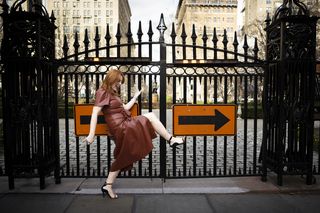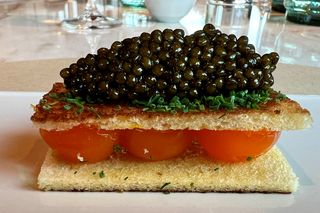Alison Goldfrapp is now good as gold
Singer Alison Goldfrapp has mellowed considerably largely due to getting over the death of her mother and coming out as gay
Alison Goldfrapp has a reputation as a bit of a dragon lady – all snarls, rolling eyes and cracking whips. She once arranged for journalists to meet her at a London hotel tricked out with a sadomasochist theme.
There she sat, tiny face hidden behind vast mosquito shades, framed by photographs of hand-cuffs and French maid corsets. It was almost certainly a metaphor for something though, frankly, after 20 minutes in her waspish company you weren't inclined to dig too deeply.
But that was then. Now Goldfrapp, a chart topping electro singer and style icon, is a changed woman: happily out of the closet, finally at peace following two years grieving for her mother. You can hear it in her music. New album, Tales of Us, might be the most gorgeous she and songwriting partner Will Gregory (technically 'Goldfrapp' is a duo) have committed to tape: a dreamy, discordant suite of dirges that splits the difference between the Twin Peaks soundtrack and Massive Attack (when they were good).
To play amateur psychologist for a moment, her public acknowledgment that she is in a long-term relationship with film editor Lisa Gunning seems, especially, to have lifted a weight from her. Literally and figuratively the whips and chains are gone. For perhaps the first time, there is a sense that the Goldfrapp you are talking to – and hearing on record for that matter – is a real person, rather than a carefully assembled persona.
In her first Irish interview to promote Tales Of Us she is in the mood for an old fashioned natter. Of the trademark awkwardness and, let's just say it, hostility, there is not a trace. Alison talks matter-of-factly about being 'outed' by accident after she and her partner were photographed together at a society event.
"Having my sexuality in the public eye didn't bother me at all," she says. "I was completely comfortable with it. People were nice. They were curious. It's not a big deal, is it?"
She hadn't planned on a big reveal. However, as soon the snap of her and Gunning began doing the rounds of the London society pages she knew the subject would inevitably come up. A journalist asked straight out if she was lesbian. She shrugged and thought 'what have I to lose?'
"It sort of happened without me doing anything about it," she says. "After the photograph, I expected people to ask."
Her family didn't see it quite the same way. The day the newspaper interview ran she received a phone-call from her sister. "They were slightly shocked. My sister said 'Alison – oh God!' They hadn't known, not officially. I was like 'yeah, it's true'. And she said 'we sort of guessed anyway'."
There and then they made a vow not to let Goldfrapp's elderly mother in on the secret. "She was old and we knew we shouldn't mention it to her. The truth would have been too traumatic I think."
Six months later her mother's health worsened and she passed away. Goldfrapp was about to embark on a huge world tour and couldn't take the time out that she needed (you can't phone up a festival and say you won't be in because your mum has died). Making matters worse, her label, eager for a hit, had arranged a string of interviews. Exhausted and in turmoil, the old grumpy Alison emerged from her cave. Sighing, she confesses things did not go well.
"I should not have done any interviews. I was jet-lagged and I was grieving. I was upset at the way the interviews went. They hadn't realised I'd lost my mother. They weren't nice to me."
Asked about her up and down relationship with the press, this is the point Goldfrapp articulates over and over: if journalists are respectful towards her, she will reciprocate. It was by standing up for herself and refusing to be pigeonholed, she suspects, that she acquired a reputation as a sour-pussed diva.
"I don't mind what you ask me," she says. "I do mind how you ask it. Sometimes I felt that journalists were deliberately provocative. I was naive and I couldn't understand why they would do that. I would get defensive. If that happens you are labeled bolshy."
Alison Goldfrapp attends the 'Tron: Legacy' UK Premiere at Empire Leicester Square in 2010
She feels her provocative persona was a factor as well. Starting with 2005's Black Cherry album, Goldfrapp embraced an upmarket BDSM aesthetic (the hit Strict Machine was a paean to the joys of a hearty spanking). For a while, she could plausibly claim to be the thinking person's Dita Von Teese. She believes this may have intimidated men, in particular, and that there was an unofficial campaign to cut her down to size.
"If you are projecting a sexual quality, perhaps men find that intimidating and want to challenge you. I was probably wide-eyed. I imagined people would be above acting that way."
She may not have had the media onside. The fashion industry, however, was in a swoon over her outre dress sense and tunes, which felt custom crafted for a busy catwalk. She was credited with a mini revival in glam in the mid 2000s, received gushing appraisals from the likes of Karl Lagerfeld and the late Alexander McQueen (before they all tumbled at the feet of Florence and the Machine). In terms of image, she also had a very visible influence on Madonna, never one to turn her nose up at a hot new trend.
Goldfrapp was flattered that Madge appeared to be lifting a trick or three (earning the tabloid putdown 'Oldfrapp' in the process). Some friends were outraged on her behalf at the barefaced nature of the appropriation. It didn't bother Alison. Speaking to me in 2010, she was dryly amused more than anything.
"I have to say, there were a couple of occasions where I was like 'didn't I just wear that outfit last week?' A couple of incidents like that. But fuck... you know, I don't know what Madonna listens to, I don't know what she does. She is probably someone who keeps her eye on what is going on."
Recently turned 47, the ephemera of pop doesn't seem to interest her nowadays. She won't be donning many wacko costumes touring the new LP, that's for sure. It would be disrespectful to the music, which has a disembodied, often nightmarish, sensibility – a quality rooted in her childhood in rural England.
"I grew up in the countryside and there is definitely a David Lynch aspect to those small towns," she says, referring to the surrealist American filmmaker. "A few of our albums were busy sonically. With this one, I was interested in stripping it down."
Speaking to Goldfrapp you get the impression that she has a lot to prove with Tales Of Us. She was vaguely dissatisfied with her previous long player, 2010's Head First. Her final collection for the soon to be defunct EMI label, she feels the project was put together in a hurry because people at the record company were desperate for a hit, any hit.
"It was incredibly rushed. We were on the last leg of our contract. A hit wasn't on our minds. It was on theirs. Sometimes labels have expectations that you don't necessarily understand or maybe don't want to fulfil. We're with a new label and everything is fine. We've never been happier, really."
Tales of Us is released today.
Join the Irish Independent WhatsApp channel
Stay up to date with all the latest news














